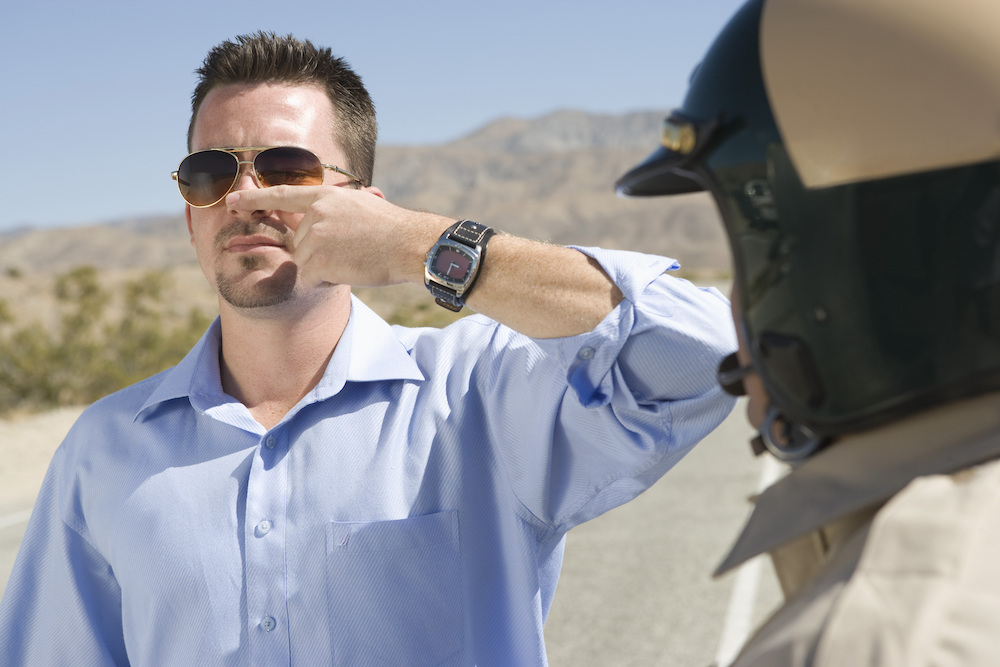Do You Need to Take a Field Sobriety Test in California?

When you think of a DUI arrest, what comes to mind? For many people, the answer is the field sobriety test. Field sobriety tests, or FSTs, are commonly depicted in the media and are generally well-known by the public. However, there's a lot more to field sobriety tests than may meet the eye. Did you know that in the state of California you can refuse to take a field sobriety test without any repercussions?
Read on to learn more about field sobriety tests in California and learn how they can impact your DUI charges.
What is a field sobriety test?
Field sobriety tests are administered by police officers at the time of a potential DUI arrest. They involve a series of mental and physical activities that would challenge one’s capacity if they were under the influence of drugs or alcohol. The National Highway Transportation Safety Administration has identified three field sobriety tests that they deem to be standard, and therefore are considered reliable by law enforcement.
These tests include:
- The horizontal gaze nystagmus test
- The walk and turn test
- The one leg stand test
Many drivers who are pulled over by law enforcement for suspicion of DUI do not know that they are not required to take a field sobriety test, even when requested by the police officer. These tests are optional and can be declined by drivers without any fear of penalties.
This is important to know because very often sober drivers can fail these three field sobriety tests, even when they are not impaired whatsoever. Drivers can fail these tests for a variety of reasons, including health issues, vision issues or even fatigue or weather.
What is the horizontal gaze nystagmus test?
During this test, the officer is looking for involuntary eye movements in response to a stimulus. When someone is under the influence, they will naturally experience a jerking motion of the eye when turned towards the left or right. The officer will ask the driver to follow an object, such as a light, with their eyes. If the eyes begin to jerk earlier than is typical, it could be an indication that the individual's blood alcohol concentration is high.
What is the walk and turn test?
This test, also referred to as a walk the straight line test, requires the driver to do a mental and physical task at the same time. The officer will ask the driver to take nine steps on a line, pivot and then take nine steps back. Although a relatively simple task, it can be a challenge for someone who has a raised blood alcohol concentration. The officer will look to identify signs that the person is intoxicated such as difficulty keeping balance, failing to walk in a straight line or follow instructions or stopping during the exercise.
What is the one leg stand test?
Similarly to the walk and turn test, the one leg stand test requires the driver to do both a physical and mental task at the same time. During this test, the police officer will ask the driver to hold their foot above the ground while counting and looking down at their foot. Again, the police officer will look for certain clues that the driver is in fact intoxicated such as loss of balance or inability to keep their foot up.
Field Sobriety Test Considerations
As we mentioned earlier, drivers in the state of California are not required to submit to field sobriety tests. There are a variety of reasons why someone who is not under the influence could fail these tests and inaccurately indicate to law enforcement that they are impaired.
There could be certain weather or environmental conditions that make passing the test very challenging, such as heavy rains, snow, ice, wind or an unlevel surface. There may also be poor lighting conditions that could make it difficult for the driver to adequately perform. Finally, if they are in a densely populated area or on the side of a busy highway, the sound may be distracting.
If you took a field sobriety test in California, there are a variety of defenses your criminal defense attorney can bring up to show that your field sobriety test may not be accurate. Drivers who have certain physical conditions may find field sobriety tests especially challenging, such as those with traumatic brain injury, older age, leg or foot problems or anxiety.
Your attorney may also be able to argue that you were not dressed appropriately to perform the field sobriety tests, thus making passing the test almost impossible. For example, a driver wearing high heeled shoes may find walking a straight line challenging on the side of the road.
If you are facing DUI charges and have questions about the accuracy of a field sobriety test, contact the DUI defense attorney at the Law Office of Joni Eisenstein. Joni Eisenstein will speak to you about your case and suggest the best defense for your situation. Contact the office today to schedule your free consultation.
